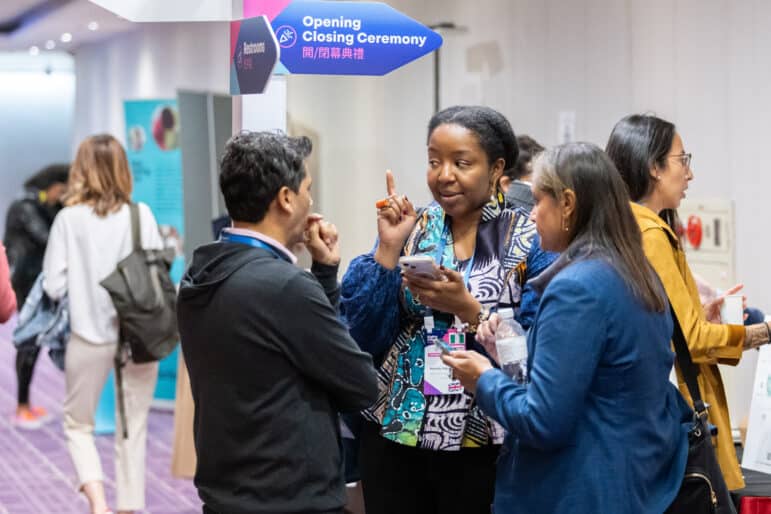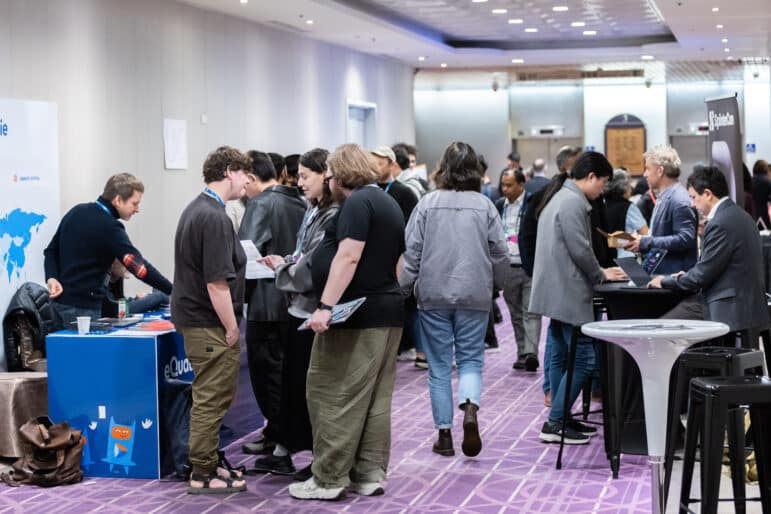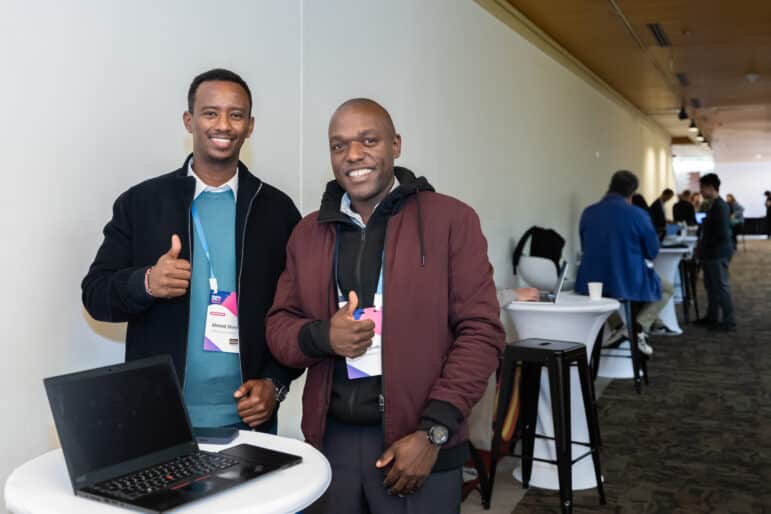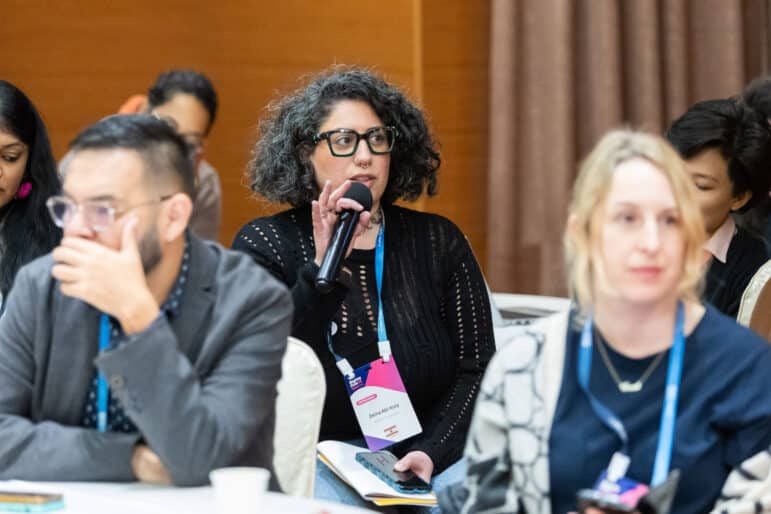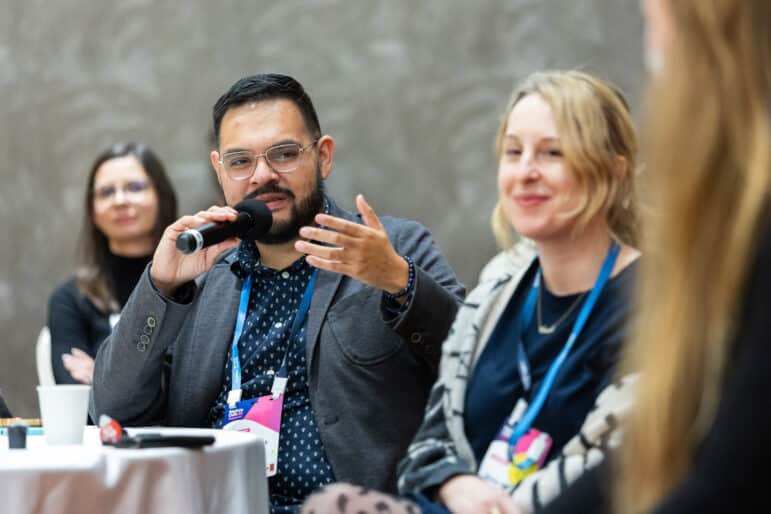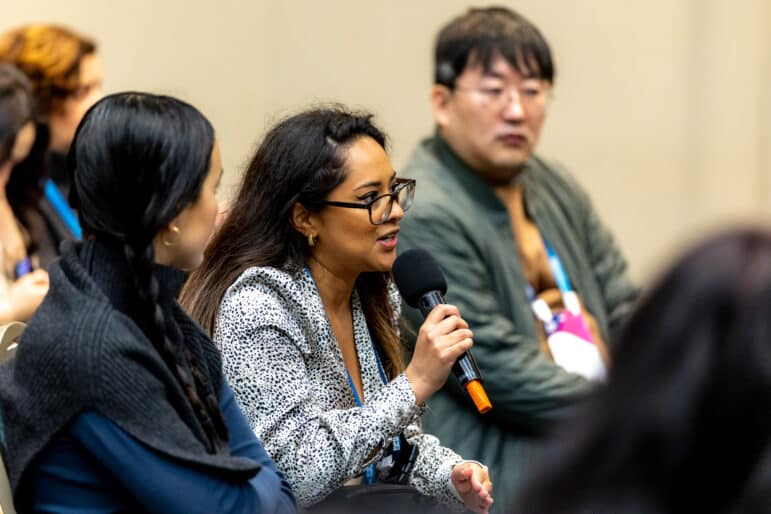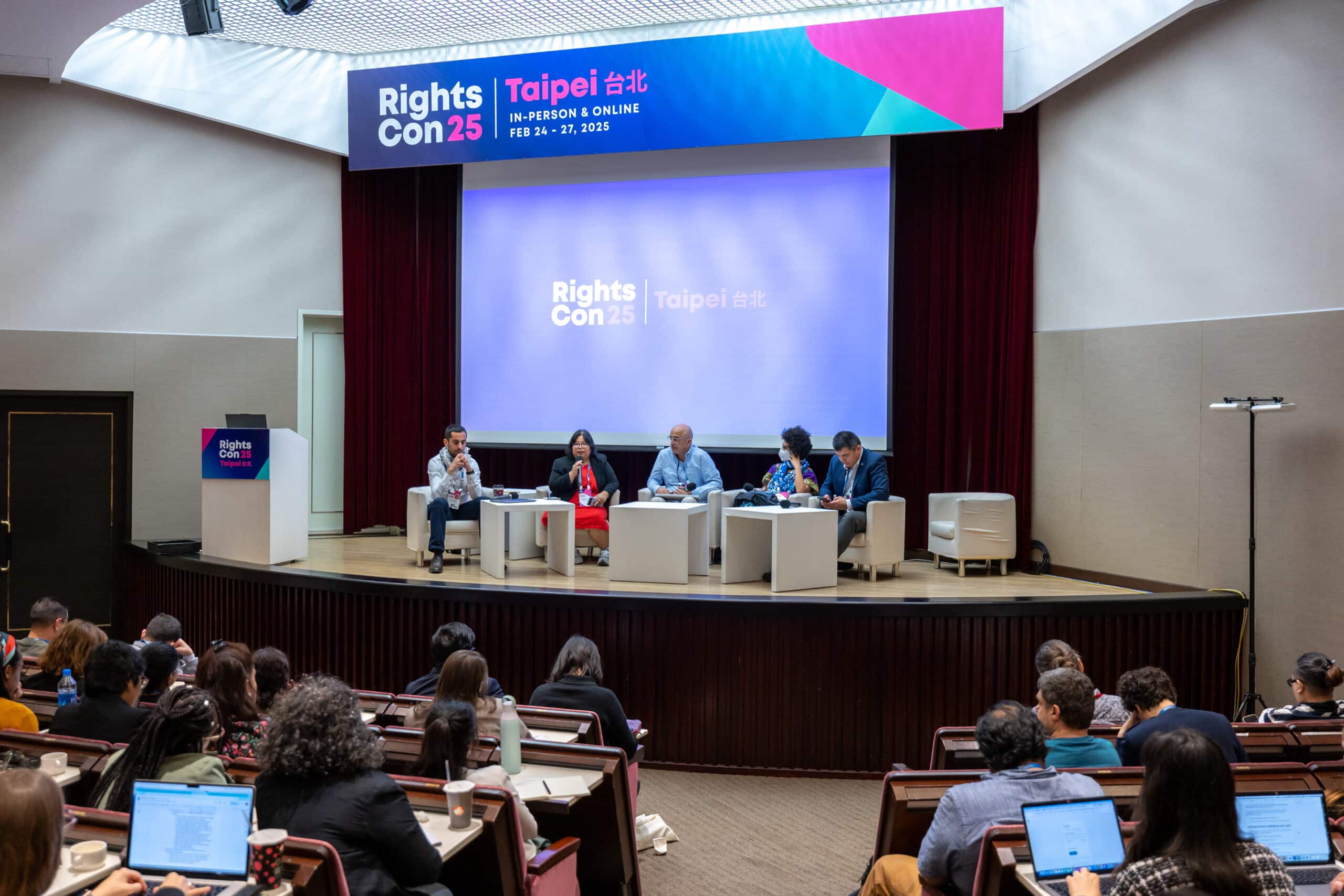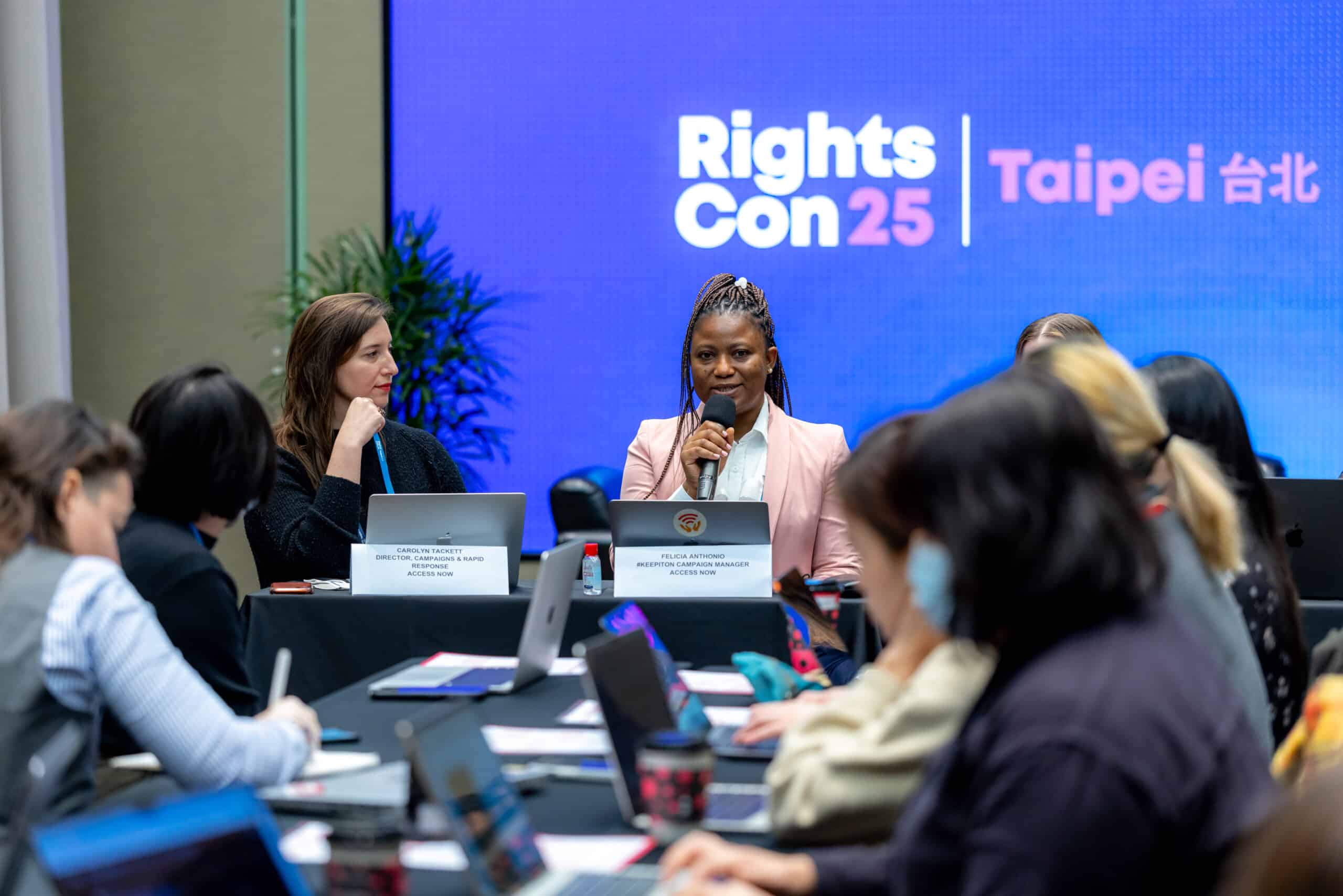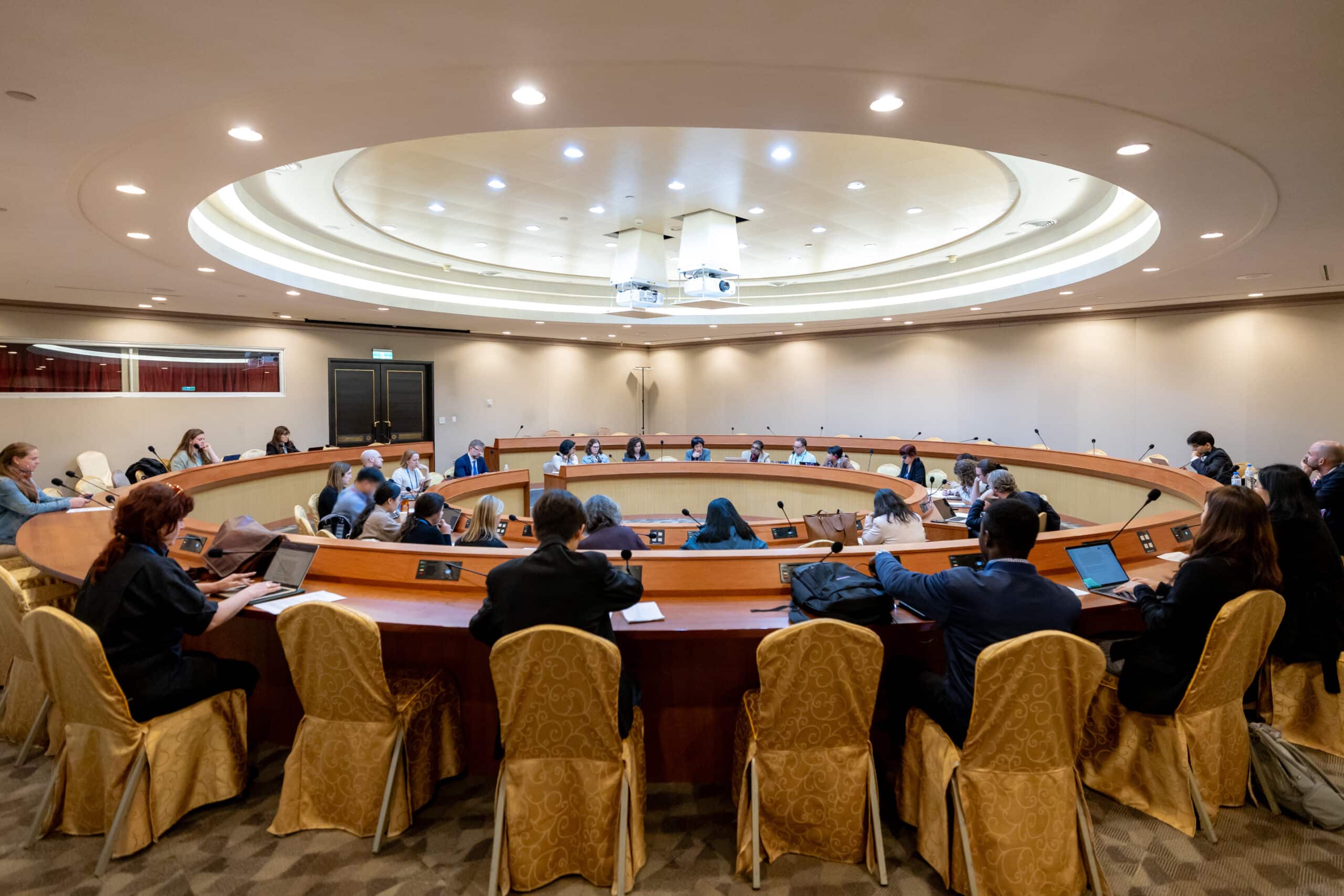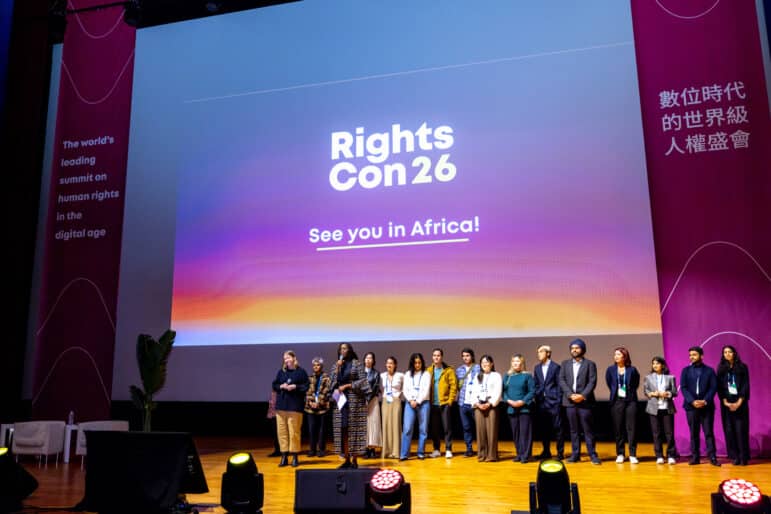Part 1:
The RightsCon Community
RightsCon is proud to be a space shaped and led by its community. Each year, people from across regions and sectors – business leaders, technologists, activists, policymakers, journalists, philanthropists, researchers, and artists – come together with different experiences, ideas, and goals. What brings them to RightsCon is a shared willingness to engage, challenge, and collaborate in the search for a rights-respecting digital future.
We’re incredibly grateful for this vibrant community, whose members contribute their time, insight, and work to each edition. They launch campaigns, form new coalitions, share strategies, and push forward conversations on human rights in the digital age.
Since the first RightsCon in 2011, this community has grown and evolved, and we celebrate the impact it continues to make. Whether RightsCon 2025 was your first time joining us, or if you’re returning as a long-time participant, know that the community is the heart of RightsCon.
Read on to learn more about the people and networks that made RightsCon 2025 possible.
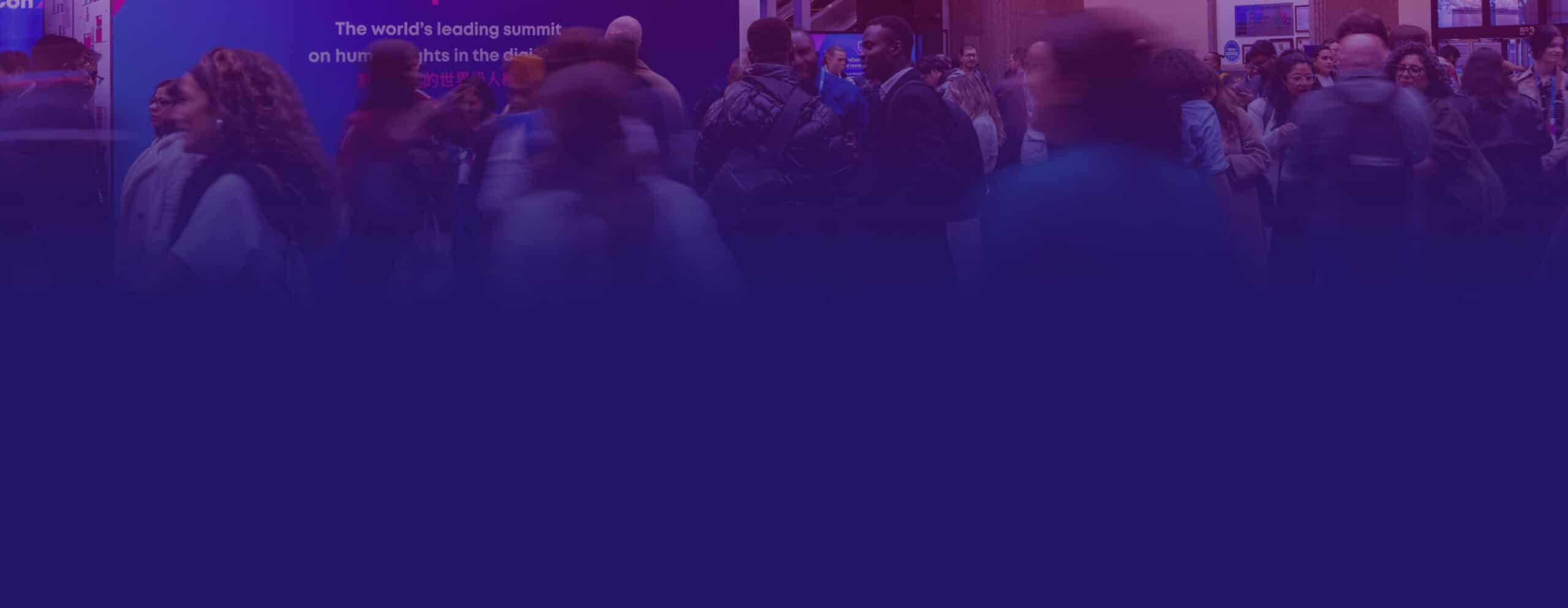
RightsCon in Taipei: our much-anticipated return to Asia
5,689
participants
(3,249 in-person,
2,440 online)
543
sessions
(638 in 2023)
3,249
in-person participants
(a new record!)
154
countries represented
(169 from 2023)
On the program:
Seventeen months after our last summit in Costa Rica, RightsCon 2025 had much to catch up on. The digital rights landscape has shifted significantly, shaped by ongoing geopolitical tensions, rising global conflicts, and the rapid growth of emerging technologies, particularly artificial intelligence. These dynamics were reflected throughout this year’s program.
With 543 total sessions, a decrease of nearly 15% from 2023, our schedule ran close to non-stop from Tuesday morning through to Thursday’s closing ceremony. This reduction was a direct outcome of community consultations following RightsCon Costa Rica, with the aim of creating a more focused and manageable program.
We recognize that 28% of surveyed participants still found the size of the program overwhelming to navigate. While RightsCon’s broad scope is part of what makes it unique, we’re committed to rethinking the program’s size for 2026 and beyond. We also heard the call for more flexible spaces to address urgent issues that fall outside our Call for Proposals. Looking ahead, we’re exploring ways to introduce more open, less-structured formats that facilitate rapid response and collective strategizing.
“My work has always been local, so getting to hear how other countries approach similar work and the regional and global trends [was] eye-opening.”
On participation:
RightsCon 2025 set a new record for in-person participation, with an impressive 3249 registered attendees, a 13% increase from 2023. The energy in the packed rooms and corridors of the Taipei International Convention Center was palpable. Our community also hosted a record-breaking 104 booths in the Community Village, highlighting a strong appetite for hallway conversations to spark synergies and collaboration.
By contrast, online participation saw a sharp drop, down 55% from RightsCon Costa Rica, even though overall online engagement remained steady compared to 2023. This decline reflects a broader trend of “online fatigue” we’ve observed across similar convenings. As we shape our plans for 2026, we’ll continue to monitor this shift and consider how to design an experience that balances accessibility with evolving participation preferences.
A global community
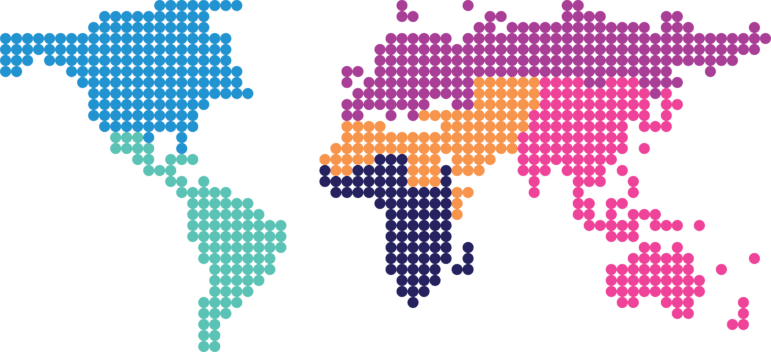
Number of participants per region

522
Africa

1,839
Asia Pacific

1,061
Europe

763
Latin America and the Caribbean

244
Middle East and North Africa

1,217
North America
A core part of our mission is to provide an inclusive platform for a global, and diverse community of human rights defenders. Over the years, we’ve introduced several initiatives to help make this possible — from the Community Support Fund, which facilitates the participation of individuals, groups and communities historically excluded from digital rights spaces, to our “no manel” (all-men panel) guideline, designed to promote gender diversity across the program.
One of the most important lessons from RightsCon Costa Rica was the need to prioritize visa support as a way to increase access to the summit. In 2025, we’re proud to have supported 362 participants in applying for Taiwan’s eVisa through the eCode process. This was made possible through our local partnership with Open Culture Foundation, and close cooperation with Taiwan’s Ministry of Digital Affairs. We also issued 746 visa invitation letters, and supported hundreds of participants in navigating different visa pathways to Taiwan.
“I had to process my visa at the very last hour of the summit, and the way [the team] helped me throughout, I’m so grateful for that. It truly made me feel that the RightsCon team valued my participation in the summit. That motivated me a lot to contribute more, and I felt like I belong to this community. I am so, so grateful for the team and your support. It means a lot.”
The Global Majority
Participants from the Global Majority made up 60% of participants at RightsCon 2025, an 8% increase from 2023. We were especially proud to see stronger representation from previously underrepresented countries in the region, including Indonesia, Myanmar, and Thailand.
Bringing Asia to RightsCon
As expected, the Asia-Pacific region led participation at RightsCon 2025, making up 32% of total participants, an impressive increase from 2023 (10%). Taiwan, ranked second in overall participation, followed by India (#4) and the Philippines (#10) among the most represented countries from the region.
Community Support Fund
At RightsCon 2025, the Community Support Fund supported 126 participants from 62 countries with a total of $216,656 in funding. This covered travel, accommodation, visa fees, stipends, internet access, and translation costs, with the goal of reducing barriers to participation for underrepresented voices.
On African representation:
We recognize the limited representation from the African continent, particularly in person, at our last summit in Costa Rica, largely due to visa-related challenges. In 2025, we were encouraged to see participants from countries such as Nigeria, Kenya, and South Africa actively engaging, networking, and strategizing with peers in Taipei, a momentum we’re excited to build on as RightsCon heads to Africa in 2026.
The US stop-work order:
The executive order issued by the Trump administration in late January, which halted foreign aid spending and paused existing grants and contracts, had a significant impact on this year’s summit. Announced just weeks before RightsCon 2025, it led to a noticeable increase in cancellations, shifts from in-person to online participation, and a drop in expected registrations. Thanks to support from trusted partner organizations we were able to provide emergency funding to some affected participants, making their travel to Taipei possible. This disruption underscores the financial vulnerability faced by many individuals and organizations working to defend digital rights globally, and it should remain a priority theme for our next summit.
Looking ahead to 2026:
Every year, RightsCon welcomes new voices from countries and communities that have historically been underrepresented. For RightsCon 2026, we will place a particular focus on strengthening engagement across the African continent. We plan to work closely with regional partners to identify and support groups that could benefit from access to our global platform.
Supporting our community:
As part of our ongoing commitment to amplify voices and perspectives, we expanded our approach to the Community Support Fund, an initiative to ensure underrepresented members of our community can fully participate in RightsCon, whether in-person or online.
Each year, we collect your feedback and refine and adapt our approach, keeping our global mission front and center. In 2025, we doubled the investment into our Fund and piloted a holistic model of support, covering flights, accommodation, visa application costs and a daily stipend. The travel Fund supported 126 participants from 62 countries, helping them expand their networks, showcase their work with a global audience, and contribute to a stronger, more inclusive digital rights community. We also supported 13 participants from 9 countries through our Connectivity Fund.
“RightsCon was a transformative experience in my personal life, and especially in my career. I know that without the travel support, I wouldn’t have been able to attend. So, thank you from the bottom of my heart. I truly hope this wasn’t my first and only RightsCon. I look forward to the chance to attend this year’s event — to learn even more, contribute, and strengthen a struggle that isn’t mine alone. It’s a collective one, and RightsCon nourishes the soul in that regard.”
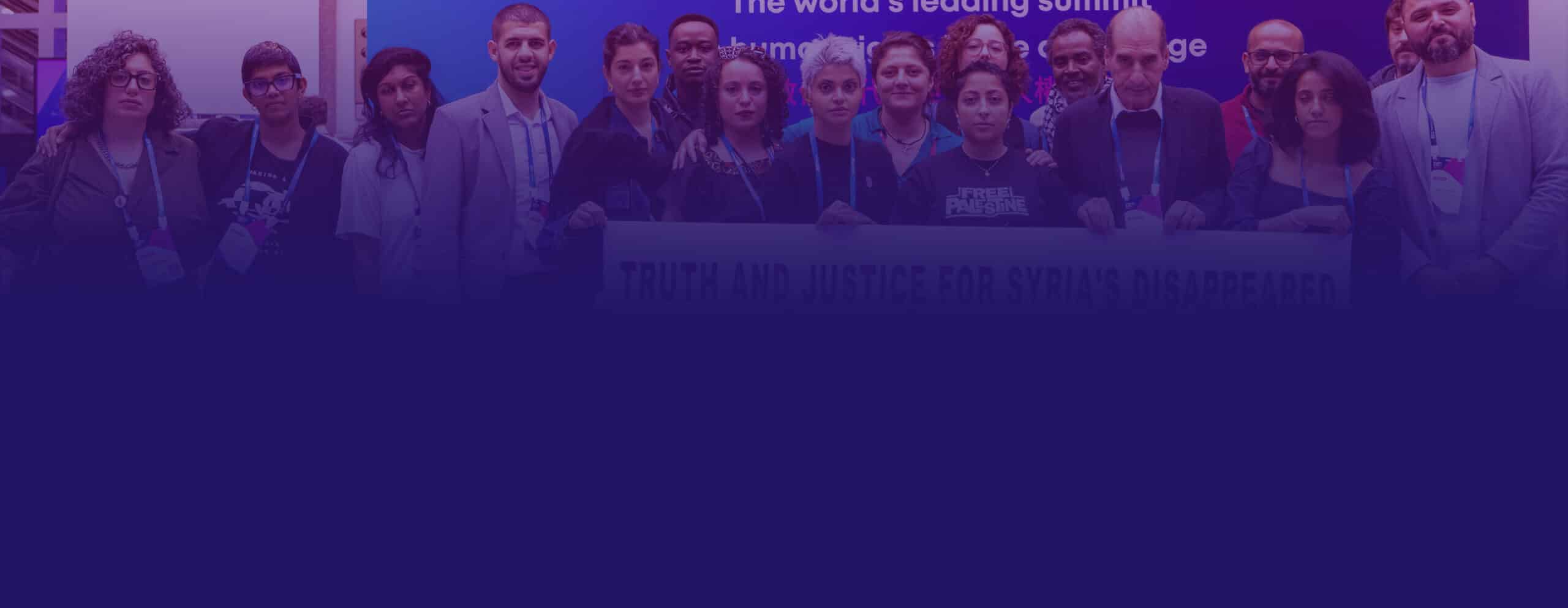
A community of multiple voices
RightsCon continues to work on bringing together communities and ensuring their equitable participation. To support this, we’ve developed initiatives over the years, such as a “no manel” (all-men panel) policy in sessions, and a Program Committee which represents diverse perspectives, genders, and regions. While we know that ensuring inclusivity requires continuous work, we’re here to share the progress we’ve made over the past years.
Gender
This year, RightsCon matched its Costa Rica record, with 57% of participants identifying as women, the sixth consecutive edition where women made up the majority of participants. We also welcomed 4% of participants who identified as non-binary, bigender, agender, or genderfluid.
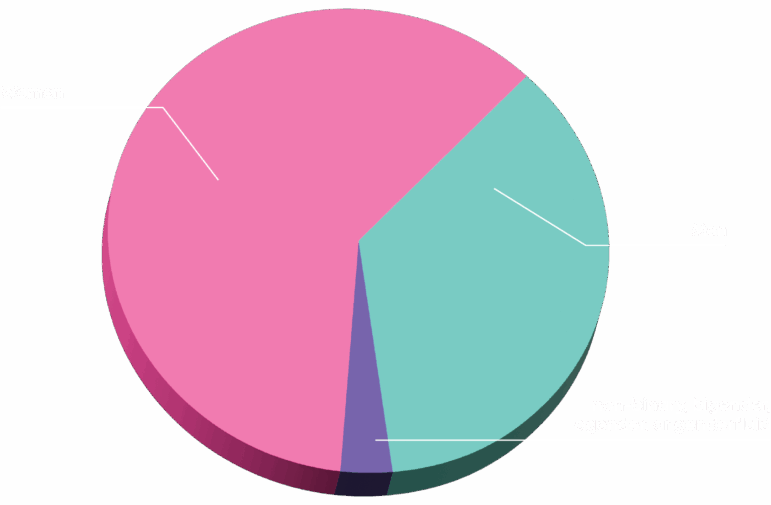
57.32%
Women
34.31%
Men
8,3%
Non-binary, agender, bigender, genderfluid, and others
Participant background
The mission of RightsCon is to bring together people from all walks of life, from civil society actors on the frontlines to government officials, academics, and private sector leaders, united by a shared commitment to advance and defend digital rights. In 2025, civil society remained the most represented sector, accounting for 56% of participants (a 6% increase from 2023), followed by academia at 11%.
56.1%
Civil Society
11.0%
Academia
7.5%
Other
7.4%
Private Sector
5.4%
Media
4.9%
Government
3.3%
Philanthropic sector
2.4%
Creative
3.1%
Intergovernmental institutions
On the multi-stakeholder model:
Since RightsCon’s inception in 2011, our goal has been to create a space for open and inclusive discussions on digital rights across a wide range of sectors. This model allows for diverse voices to connect, collaborate, and candidly engage on the critical issues shaping our digital future. We’ve heard your feedback and concerns about tensions within the model and the need to rethink its sustainability, including evaluating how all stakeholders contribute meaningfully to the community. Our commitment is to ensure RightsCon remains responsive to your needs, and we plan to consult more deeply with our community as we reflect on and refine our multi-stakeholder approach to convening.
On media:
Media has long been a part of RightsCon, and for 2025, we set out to create a more robust and supportive experience for journalists and media professionals. For the first time, we introduced a dedicated Media Lounge, designed as a space to write, record, and work, along with a specific badge and lanyard to support access and visibility. This year, 116 registered media representatives covered the summit, including outlets such as The New York Times, WIRED, Tech Policy Press, Al Jazeera, TaiwanPlus, and others. As we look ahead to 2026, we’re committed to refining our media strategy and building on this year’s progress.
Part 2:
Outcomes & Highlights
RightsCon is where many in our community bring their work into the spotlight, sharing their progress, launching new initiatives, and building the partnerships needed to defend and extend our digital rights. It’s a unique chance to showcase their work to a multi-stakeholder ecosystem—including academia, civil society, government officials, intergovernmental institutions, philanthropic institutions, the private sector, media, and more—bringing their advocacy, organizing, and research to a global stage.
The impact of RightsCon doesn’t end with the Closing Ceremony. Many of the outcomes we’re highlighting in this report reflect long-term dedication, shaped and strengthened across months and even years of hard work. At the same time, the ideas, connections, and strategies exchanged during RightsCon 2025 will continue to evolve in the years ahead, informing future collaborations and projects.
In this second part of the RightsCon 2025 Outcomes Report, we’re focusing on the tangible impact: the launches, coalitions, and community-led initiatives that took root during the summit. From new frameworks to public statements and advocacy roadmaps, these outcomes show RightsCon’s role in driving action, and how the digital rights movement is ever-evolving.

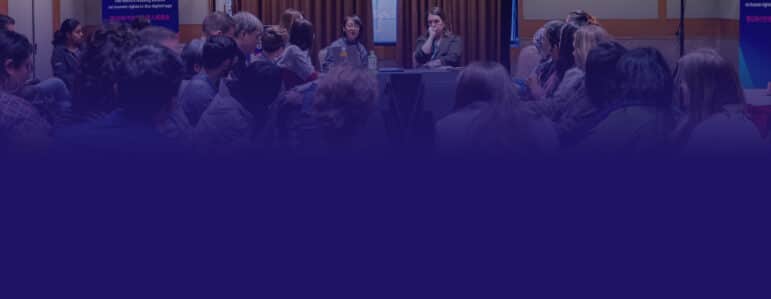
RightsCon 2025 program highlights
As a reminder, registered participants can access the RightsCon Summit Platform to explore the full program and watch recorded sessions, including online dialogues, lightning talks, and tech demos.
Top 3 categories
- Tactics and Contexts for Activists
- Content Governance
- Governance, Politics, and Elections
Top 3 intersecting themes
- Gender justice
- Indigenous rights
- Youth & children’s rights
Top 3 stakeholder groups
- Civil society
- Academia
- Private Sector
Key takeaways
Over four days, 500+ sessions and countless in-person and online conversations, we heard diverse voices from around the world share their insights into the contexts and challenges critical to our collective mission. The takeaways below reflect some of the most pressing themes and ideas that emerged from RightsCon 2025, and point towards the direction the digital rights landscape will be moving in the years ahead.
Shrinking funding for digital rights
RightsCon 2025 took place against the backdrop of a major foreign aid freeze by the United States government, further intensifying pressure on civil society operating in shrinking and increasingly hostile spaces. Over the course of the summit, many participants voiced concerns about the future of digital rights, igniting multiple conversations on alternative pathways to fund and sustain their work. Stakeholders, especially those from the Global Majority, called for funding models that move away from reliance on government aid and traditional philanthropy. Discussions explored a range of strategies to build more resilient and flexible funding ecosystems, including mutual aid, strategic litigation, advocacy, and media engagement.
Warfare in the digital age
Amid the ongoing militarized conflicts in Palestine, Sudan, Myanmar, Ukraine, and beyond, a central theme at RightsCon 2025 was the digitalization of warfare and the growing role of technology in modern conflict. Conversations focused on the escalation of digital harms, from transnational spyware and internet shutdowns to cyberattacks and the deliberate destruction of communications infrastructure. While the path to peace remains uncertain, new approaches are emerging. One such effort, the Digital Ceasefire, looks to modernize the normative frameworks and language used in negotiating ceasefires to reflect the realities of occupation, armed struggle, and warfare in the digital age.
Artificial intelligence on the agenda
Beyond discussions on AI governance, the summit served as a vital platform to surface concerns around transparency, accountability, and the global AI divide. Participants emphasized that the concentration of AI infrastructure in the hands of a few dominant tech companies poses grave risks to technological sovereignty and tips the scales further in favour of digital colonialism. Similarly, calls were made on the need to promote AI literacy and invest in building workforces that can critically shape and challenge the future of AI. In other rooms, stakeholders drew attention to the often-overlooked ecological and social costs of AI and called for systemic action across technical and regulatory frameworks.
Holding platforms accountable
The RightsCon community continually underlined the need for stronger accountability mechanisms for digital platforms, especially in the context of conflict, crisis, and elections. As disinformation, hate speech, and state-sponsored propaganda proliferate, platforms must be held responsible for content moderation practices and algorithmic transparency. Civil society will continue to push for greater oversight and independent audits, particularly in Global Majority countries, where platform failures often have the most severe consequences.
Messages of resilience and solidarity
Whether in person or online, RightsCon 2025 was defined by powerful displays of resilience and solidarity among digital rights activists and civil society working under increasingly difficult conditions. Across regions and movements, our community shared tactics to push back in the face of surveillance, repression, and resource scarcity. From multi-stakeholder coalitions to cross-border legal collaboration and digital security helpdesks, the message was clear: our collective strength is vital, now more than ever.

RightsCon’s multi-stakeholder model in action
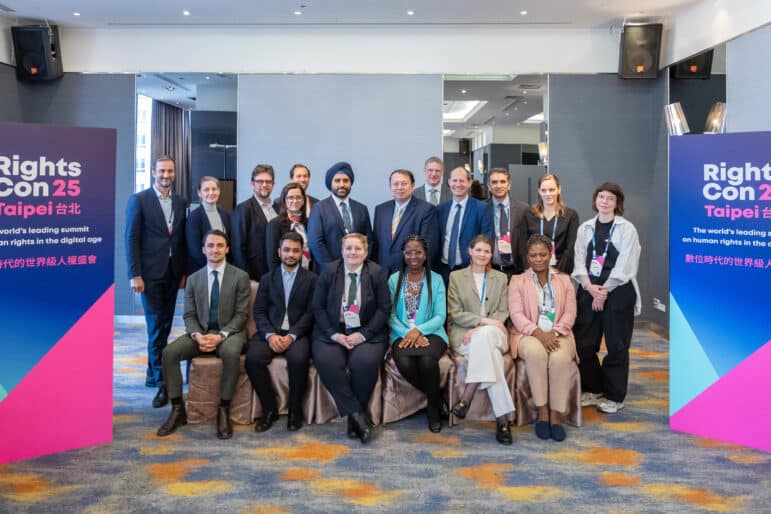
The Cyber Ambassadors meeting at RightsCon 2025.
Government-led initiatives
At RightsCon, government-led initiatives helped bridge the gap between the public service and civil society through sessions like the AI Action Summit Post-Action Convening, which expanded on discussions held earlier this year in France. The Cyber Ambassadors and Digital Diplomats Conclave brought representatives from Australia, France, Germany, Switzerland, Denmark, United Kingdom, Sweden, Belgium, Canada, Taiwan, Ghana, and the Netherlands to discuss topics like AI diplomacy, cybersecurity cooperation, and digital governance. The Roundtable on Policy Leadership in the Digital Era convened regulatory experts from Brazil, Moldova, Philippines, Australia, international governance bodies, and civil society to explore pressing issues such as digital sovereignty, international cooperation on enforcement and transparency, and innovative strategies to address regulatory capacity gaps.
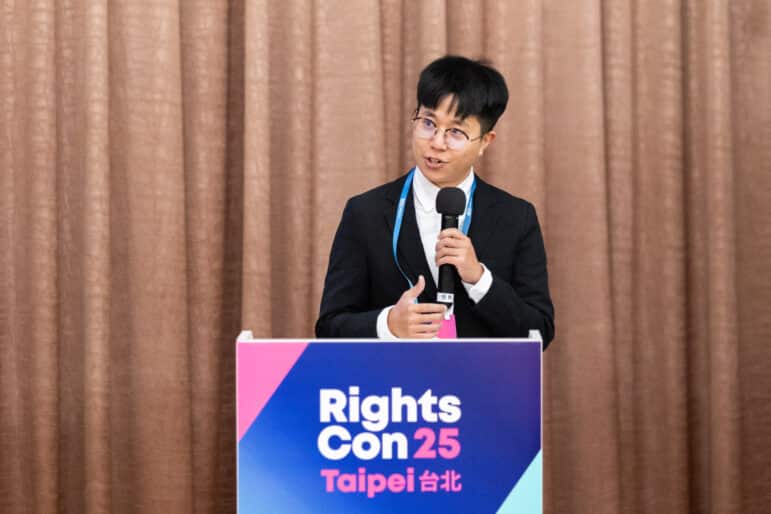
Opening Remarks during this year’s Young Leaders Summit.
Young Leaders Summit
The 5th edition of the Summit brought nearly 70 young leaders from 30 countries to Taipei to engage in a wide range of topics, including the weaponization of information, such as disinformation campaigns, AI-driven narrative manipulation, the rise of authoritarianism, and strategies for strengthening digital rights advocacy through multi-stakeholder collaboration, robust legal frameworks, and youth-centred solutions to reducing online harms.
By exchanging local perspectives, amplifying youth-led initiatives and centering youth voices, the summit provides a platform for young leaders to co-create a safer, more equitable, and resilient digital future.

Participants walk through the Community Village.
Community Village
Our largest Community Village to date featured 104 booths spread across two floors of the Taipei International Convention Center. The exhibition space saw vibrant engagement, with people connecting, networking, and exploring the work of civil society organizations such as The Tor Project, DWeb, 7amleh, and many others. Visitors also had the chance to speak directly with companies like NordVPN and SurfShark, engage with global organizations like Amnesty International and Wikimedia Foundation, and discover creative projects like Flash Drives for Freedom.

Art exhibition as one of RightsCon’s side events
Side Events
RightsCon is also a key moment for the community to organize events alongside the summit, and Taipei offered an environment for everything from intimate gatherings to larger public sessions. This year, partners hosted a range of dynamic side events, including the g0v hackath65n, a joint workshop by the National Human Rights Commission of Taiwan (NHRC Taiwan) and the Commission on Human Rights of the Philippines (CHRP), and cultural programs like They told me it’s not your fault. And I told them everything will be fine, an art exhibition organized by the Friedrich Naumann Foundation.
Regional spotlights
Taiwan’s Vice President, Hsiao Bi-khim, and Vice Premier, Cheng Li-Chiun, opened the summit by highlighting the importance of collective action towards an open, inclusive, and rights-respecting digital future.
The National Human Rights Commission (NHRC) and the Philippine Commission on Human Rights (CHR) jointly hosted the 2025 Digital Human Rights International Workshop, refocusing on the challenges of safeguarding human rights amid threats posed by artificial intelligence (AI) and digital security.
Amnesty-Taiwan presented a statement, alongside seven local organizations, demanding that the Taiwanese government’s approach to digital governance respects human rights and the rule of law.

Reflections and insights from the community
One of RightsCon’s greatest strengths is the depth and diversity of insights shared by the community. Their reflections help us see the summit through multiple lenses and offer a clearer view of the digital rights landscape in 2025: the challenges we face, the shifts underway, and the strategies for moving forward.
The Trust and Safety Foundation attended RightsCon for the first time and hosted two sessions on advancing Trust & Safety for the Global Majority. Read more about their roundtable, supported by TSF’s Global Majority Research Committee, and their private meeting, co-organized with the Global Network Initiative.
International Service for Human Rights shares their reflections on advocating for justice and protecting human rights defenders in the digital era.
From platform accountability during crises and addressing human rights in Palestine, to fighting internet shutdowns, countering transnational surveillance and repression, and standing in solidarity with Alaa Abd El-Fattah—read Electronic Frontier Foundation’s reflections from RightsCon 2025.
The Merl Tech Initiative’s session recap offers insights into assessing humanitarian AI and outlines the M&E frameworks needed to ensure the sector can effectively measure the impact of these tools.
“RightsCon 2025 underscored a digital rights ecosystem at a crossroads.” The Alliance for Philanthropy and Social Investment Worldwide shares insightful commentary on the shifts, gaps, and opportunities for funders and philanthropic actors in the digital rights space.
The Open Knowledge Foundation published an overview of the state of digital rights and activism based on their participation at RightsCon 2025. From the impact of gender-based violence on democracy to spotlighting art as a form of resistance, the article takes a look at some of the key themes at play during the summit.
Wikimedia posted an article detailing their takeaways from RightsCon 2025, highlighting the need for stronger collaboration, sustainable funding, and aligning AI regulation with media literacy.
Wired, present at RightsCon, published activists’ reflections on the impact of the US administration’s foreign aid cuts.
Tech Policy Press details insights from experts at RightsCon, addressing the global crisis in democracy and the shift towards a new world order following the U.S. government’s withdrawal of support for pro-democracy efforts worldwide.
Researchers linked to the Digital Futures for Children centre at LSE present their reflections on the discourse surrounding children’s rights in the digital age.
Vita Activa shares what they learned from Global Majority Digital Security Helplines at their workshop in Taipei.
Alix Dunn, host of the Computer Says Maybe podcast, organized an episode at RightsCon with Carly Kind, Australia’s Privacy Commissioner, on regulating privacy in the AI era.

New partnership initiatives
For RightsCon 2025, we launched two partnership initiatives designed to give participants new, creative ways to engage with the program. These collaborations opened up avenues for advocacy, storytelling, and recognition in digital rights. Learn more about each initiative below:
Stop Surveillance Copaganda
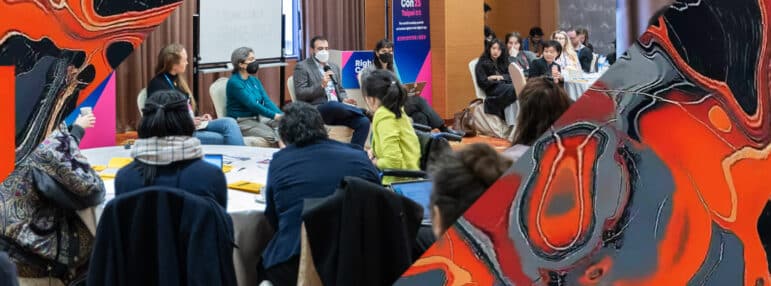
The Stop Surveillance Copaganda project – a short story contest collaboration between Fight For the Future, Strange Horizons, COMPOST Magazine and DWeb – hosted a satellite event and two workshops exploring how to counter surveillance narratives in media and storytelling. Selected through an anonymous review process, contest winner and author, Christopher R. Muscato joined us in person in Taipei to contribute to the development of a toolkit aimed at helping writers craft more just and equitable fiction in an age dominated by centralized surveillance technologies and copaganda.
“In order to have a rights-respecting digital future, we have to be able to envision it and communicate it beyond the echo chambers of civil society and our communities of immediate influence. This is where artists come in. Initiatives like the Stop Surveillance Tech Copaganda Project don’t only allow us to connect in spheres where we have largely been absent, these projects also have the potential to generate a long tail of better stories and imagined worlds that support our work and give the broader public vision for a digital future worth fighting for. We all need visions of a better world to believe in, that inspire us and keep us going. We’re grateful to all the authors who participated in this project for opening up a place at RightsCon where we could discuss our work in a new light, and advocate for change in a unique way.”
Lia Holland, Campaigns & Communications Director, Fight for the Future.
For more details about the sessions and to explore the toolkit, read DWeb’s RightsCon report back.
Privacy and Human Rights Award
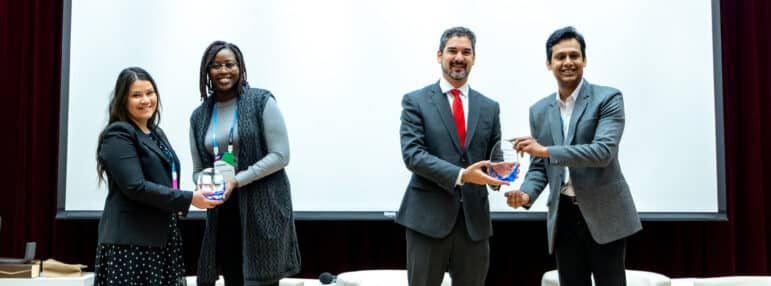
The inaugural Privacy and Human Rights Award, developed by the Global Privacy Assembly (GPA) shines a spotlight on exceptional leadership and varying initiatives in the fields of privacy, data protection, and human rights at the international, national, and local levels.
The award was presented at RightsCon 2025 to Internet Freedom Foundation (IFF) and 5Rights Foundation — two organizations working to safeguard the digital rights of millions across the globe.
“I stand here to acknowledge not just IFF’s role, but the loud, loose, messy, diverse collective of academics, activists, journalists, lawyers… We at the IFF view the accolade not just for the work we have done, but an encouragement for the work to be done ahead.” Apar Gupta on behalf of Internet Freedom Foundation
“The digital environment was not designed with children in mind. So [5Rights] have fought hard that children’s rights are embedded by design and by default.” Marie-Ève Nadeau on behalf of 5Rights Foundation
Read more about the award on our blog.
Part 3:
Learnings & Looking Ahead
As we close out RightsCon 2025 and look ahead to RightsCon 2026, we’re reflecting not just on the state of the summit, but on the broader digital rights landscape and the evolving needs of the community we convene.
Since the Closing Ceremony four months ago, we’ve been gathering your valuable feedback through our participant survey (thank you to the hundreds of you who responded!), direct messages via the Rundown newsletter, and conversations with our partners and peers. These insights have helped us identify where we succeeded and where there’s room to grow.
In this final installment of the Outcomes Report, we’re sharing what we’ve learned from RightsCon 2025 and how those learnings are shaping our plans for 2026 and beyond.


Balancing scale and responsiveness
Over the years, we’ve been intentional about how RightsCon evolves, not just in size, but in purpose. One of the things that sets RightsCon apart is our grassroots approach to program building. We work to create space for voices that are often sidelined, and we prioritize access, diversity, and participation from all corners of the digital rights ecosystem.
That commitment has shaped our expansive program, which has helped surface issues and spotlight actors who might not otherwise be heard. But we’ve also heard clearly that the scale of RightsCon can feel overwhelming. And as the digital rights landscape shifts faster each year, our ability to stay responsive is more important than ever.
With RightsCon 2026 on the horizon, we’re taking a thoughtful step toward balance. That means a slight recalibration of our scale, particularly for online sessions, and building in more flexibility to our program building process to respond to sensitive or urgent current events.
Our goal isn’t to do less. It’s to expand on what we do best: convene a global community in a way that remains grounded, impactful, and responsive to the world we’re working to change.
Supporting the community
In our RightsCon Costa Rica Outcomes Report, we recommitted to putting the community at the heart of everything we do. Since then, we’ve taken concrete steps to prioritize access, care, and inclusion in our decision-making.
For RightsCon 2025, that commitment shaped how we approached some of the most critical areas for participation.
We took a more holistic approach to visa access, working closely with our local partner, Open Culture Foundation, and engaging directly with various branches of the Taiwanese government. Through the eVisa and eCode process, we were able to help 362 community members obtain a visa to Taipei, representing 12% of our in-person participants.
Our Community Support Fund also expanded significantly. We distributed $216,656 in support to 126 participants, helping to remove financial barriers for those who otherwise might not have been able to attend.
We simplified our registration process and introduced more flexible pricing. Our “pay-what-you-can” option for online tickets, along with the new Supporter ticket tier, allowed those with greater resources to contribute to the broader community and directly support their participation.
We also recognized that the topics at RightsCon are emotionally charged and very personal to a lot of us. For the first time, we introduced a psychosocial support space in the newly created Quiet Area for in-person participants in Taipei. Online participants had access to trained support through our partner,Vita Activa.
Looking ahead to RightsCon 2026, we remain committed to building on these efforts and exploring new ways to meet the evolving needs of our community.

Reflecting on the multi-stakeholder model
At its core, RightsCon is a convening space where a diversity of voices can come together to help shape the future of digital rights.
This model is what gives RightsCon its depth. Over the years, we’ve hosted executive directors, researchers, CEOs, grassroots organizers, government and intergovernmental representatives, philanthropists, and many many more. It’s through this mix that new ideas surface, unlikely collaborations form, and the most pressing issues are examined from multiple angles.
But we also recognize that this model is not without its tensions.
Throughout RightsCon 2025, we heard thoughtful feedback and tough questions: who should be platformed? What responsibilities do different actors carry in a space like ours? How can we foster meaningful, respectful, and productive engagement across very different lived experiences and power dynamics?
We’re not shying away from these questions. In fact, they are essential to the work of maintaining and evolving a truly multi-stakeholder space. As we look ahead to RightsCon 2026, we remain committed to maintaining our multi-stakeholder model. Not as a fixed formula, but as a framework we must continue to examine, challenge, and refine together with you, the RightsCon community.
What to expect for RightsCon 2026 in Africa
RightsCon 2025 presented us the opportunity to reflect on the learnings from RightsCon Costa Rica, to identify the areas we should be focusing on more and the initiatives we should sunset or adapt. Those are key moments in adjusting our ways of working to ensure we are a valuable space for the community.
We’re excited to take the learnings for this year and apply them to our long-awaited return to Africa in 2026.
This return carries a deep significance. In 2023, many participants from Africa were unable to attend RightsCon Costa Rica due to visa challenges. We made a commitment then to return to the continent to enable broader participation from this important digital rights community. That promise has guided our planning, and it continues to shape our vision for the next summit.
The African region has seen an incredible surge of human rights defenders, researchers, and digital rights initiatives since our last summit in Tunis in 2019. We can’t wait to bring back RightsCon to the continent and to hear from local organizations, connect with new colleagues, and learn about how we can collectively build a rights-respecting future. RightsCon 2026 will be a space to celebrate the region’s diversity and its vital contributions to the global digital rights discourse.
We can’t wait to see your new connections, collaborations, and outcomes at the next RightsCon!
Conclusion
From Silicon Valley in 2011 to Taipei in 2025, RightsCon has moved, evolved, and adapted alongside the shifting realities of our communities and the global landscape of policy, advocacy, and activism.
As we officially wrap up the 2025 cycle, the RightsCon team feels deep gratitude for the passionate and committed community we convene. The successes of RightsCon 2025 are a result of your continued engagement and honest feedback, which challenge us to grow and to serve you with care and purpose. It is a privilege to host a space for your insights, your questions, and your collaborations. Your contributions continue to elevate and advance the global conversation on digital rights.
RightsCon exists because of the hard work and dedication of thousands of people. To our session organizers, facilitators, speakers, production and platform companies, local and global partners, volunteers, program committee members, Access Now colleagues, and the wider digital rights community: thank you!
We can’t wait to see you in Africa (and online)!
With gratitude,
Adriana, Daphne, Elan, Igor, Luis, Nikki, and Sarah
Keep up to date with RightsCon
Get our newsletter for updates on tickets, speakers, and programming.
Get in touch with us at [email protected]


